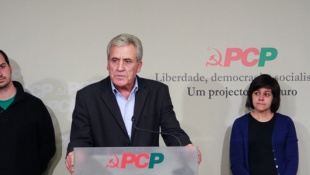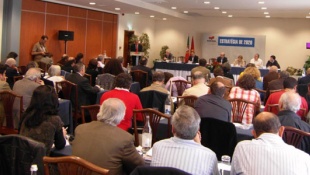t the invitation of the Portuguese Communist Party, on July 5th. and 6th., an international meeting took place in Guimarães, under the theme "Against Casual Labour and Flexicurity, right to work, work with rights. For a Europe of the workers and the peoples " with the participation of 13 communist and other left parties from Europe.
The meeting enabled a useful exchange of information and opinions on the current situation in Europe, on matters of the European Union, and on the importance of strengthening the cooperation among communist parties and other left forces. The participants saluted the Portuguese workers and labour movement for the dimension and objectives of the rally for “employment with rights – a social Europe”, promoted by CGTP/IN, in which they also took part.
Taking into account the existing diversity of situations, the participants denounced the particularly severe social situation in Europe, product of the present neo-liberal offensive, with an increase of social inequalities, the spread of poverty and social exclusion, mass unemployment – particularly affecting the youth and women – and the generalization and vulgarization of precarious, temporary and part-time labour.
The participants expressed their rejection of the precariousness of labour relations set down in the proposals of the Green Paper on labour legislation – the “modernization of labour legislation” and the plan to change the directive on the organization of the working time. Also condemned and rejected was the current EU agenda to impose the so-called “flexicurity”, to liberalize unfair dismissals without, to target collective bargaining and restrict the organization of the workers and their capacity to fight. The participants repudiated the attack on public services, their privatization, and the liberalization of these services through the Bolkestein directive and the pressures to transpose it rapidly into the national legislations of the EU countries.
Simultaneously, the participants expressed great concern and worry with the increasing infringement of fundamental rights, freedoms and guarantees of citizens taking place in several countries, as witnessed by the policy of increased control of immigrants and the adoption of increasingly repressive and “securitary” measures.
The meeting stressed that, in spite of the changes introduced in order to soften the ambitions of a “European Constitution” rejected by the popular will, the decisions of the European Council, on the 21st and 22nd of June take part in a process that has as examples the Maastricht, Amsterdam and Nice treaties and the Lisbon Strategy represent a new qualitative leap forward in capitalist integration and the configuration of Europe as an economic, political and military block contrary to the interests of the workers and the peoples. Special concern was voiced regarding the attempt to subordinate the Portuguese Presidency of the EU, just initiated, to the imposition of a “new” Treaty negotiated among the heads of state that encompasses the recovery of essential aspects of the previous treaty proposal and simultaneously seeks to avoid the necessary information, debate and popular participation. On this aspect, the participants stressed, depending in the national specificities of each State, their demand for a guarantee that peoples will be consulted through referenda to be held in each of the EU member states.
Participants underlined the urgency to halt the current neo-liberal offensive and the need for a real break away from its political guidelines, ensuring priority is given to the value of work and workers. They defended that there is a need for a policy to fight poverty, economic and social inequalities – namely with the adoption of ways to fight the extraordinary worsening of the produced wealth distribution - a policy of promotion of employment with rights and of vocational training, of public services, guaranteeing the social functions of the State in health, education and social security, as well as ensuring a policy of development at the service of society, a policy of social progress and development, which demands the defence of a strong, dynamic and efficient public sector and the support to production, in accordance with the specificities of each country. Also stressed were the necessity of a break away from market liberalization policies and the adoption of measures that counter and put a stop to the industrial restructuring and de-localisations that, while exclusively seeking a rise in profit rates, promote social dumping.
Valued and greeted were the important and courageous struggles of the workers against the current policies and in defence of the labour rights achieved through decades of hard struggles, and reiterated the denunciation and combat against the militarist policies that accompany anti-social guidelines – namely the plans to militarize the EU – against the well-known will of the majority of the populations directly at stake - a new enlargement of NATO, the installation of new military bases and the US plans of installing in Europe components of its “anti-missile shield” strategic offensive program.
Conscious of the importance, for the future of the workers and the peoples of Europe, of the battles that lie ahead, the participants underlined the importance of strengthening cooperation, made several suggestions for common or converging lines of intervention and initiatives, and noted the importance of the articulating their intervention in the international bodies in which they are represented, namely in the Parliamentary Assembly of the Council of Europe and in the European Parliament. In this regard, the participants considered the need for common or convergent actions of explanation, exposure and struggle against the principles of liberalization and deregulation of labour relations implicated in the attempt to impose the flexicurity model.
The participants voiced a strong appeal for the mobilization of the workers and the populations of the different countries all over Europe against capitalist policies, the domination of the monopolies and in favour of a Europe of peace, friendship and cooperation, respecting the dignity of those who work, a Europe engaged in the progress of the peoples.

